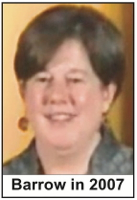Rascals case in brief
In the beginning, in 1989, more than 90 children at the Little Rascals Day Care Center in Edenton, North Carolina, accused a total of 20 adults with 429 instances of sexual abuse over a three-year period. It may have all begun with one parent’s complaint about punishment given her child.
Among the alleged perpetrators: the sheriff and mayor. But prosecutors would charge only Robin Byrum, Darlene Harris, Elizabeth “Betsy” Kelly, Robert “Bob” Kelly, Willard Scott Privott, Shelley Stone and Dawn Wilson – the Edenton 7.
Along with sodomy and beatings, allegations included a baby killed with a handgun, a child being hung upside down from a tree and being set on fire and countless other fantastic incidents involving spaceships, hot air balloons, pirate ships and trained sharks.
By the time prosecutors dropped the last charges in 1997, Little Rascals had become North Carolina’s longest and most costly criminal trial. Prosecutors kept defendants jailed in hopes at least one would turn against their supposed co-conspirators. Remarkably, none did. Another shameful record: Five defendants had to wait longer to face their accusers in court than anyone else in North Carolina history.
Between 1991 and 1997, Ofra Bikel produced three extraordinary episodes on the Little Rascals case for the PBS series “Frontline.” Although “Innocence Lost” did not deter prosecutors, it exposed their tactics and fostered nationwide skepticism and dismay.
With each passing year, the absurdity of the Little Rascals charges has become more obvious. But no admission of error has ever come from prosecutors, police, interviewers or parents. This site is devoted to the issues raised by this case.
On Facebook
Click for earlier Facebook posts archived on this site
Click to go to
Today’s random selection from the Little Rascals Day Care archives….
Click for earlier Facebook posts archived on this site
Click to go to
Today’s random selection from the Little Rascals Day Care archives….
Oh, those consequences of imaginations run amok
Dec. 21, 2012
“In the accusatorial post-McMartin climate, day care providers… took measures to protect themselves from false allegations. They installed video cameras to record all of their activities, opened up private spaces to public view by taking down doors to bathrooms and closets and, fearing the act now could be misinterpreted, stopped hugging and holding their young charges.
“State legislatures… hurriedly mandated the fingerprinting and criminal records check of all current and prospective day care providers; state licensing agencies tightened regulations and by legislative fiat were given more teeth to enforce them. Yet insurance liability premiums soared, forcing many small day care centers out of business and many more, unlicensed and uninsured, to go underground.
“Heralded at the start of the (1980s) as playgrounds for children, day care centers were feared at its end as playthings of the devil.”
– From “The Devil Goes to Day Care: McMartin and the Making of a Moral Panic” by Mary De Young in the Journal of American Culture (April 1, 1997)
Second to none was North Carolina’s overreaction, highlighted by the creation of “interagency task forces.”
View from Edenton: ‘I never considered leaving’
 April 29, 2013
April 29, 2013
If you watched “The Plea,” the concluding 1997 installment of “Innocence Lost,” you might not expect that Nancy Smith Barrow, Betsy’s sister, would choose to remain in the midst of those townspeople who caused her family such brutal and unjustified pain.
But stay she has, raising a family and participating in community affairs. I talked to her recently about her life then and now.
Why she has continued to live in Edenton:
“I never considered leaving. My parents were here. This is my home. For a long time, I imagined my dad, mom, sister and I would be back here together, after it all unraveled, after people looked behind the curtain and saw the Wizard….”
What Edenton was like for her during the Little Rascals panic:
“I’d walk into a public place and scan the room to see if I would be comfortable there. I never felt any physical threat – that’s not the kind of people they are here…. But I didn’t want my children exposed to such obvious and outward hatred….”
What Edenton is like for her today:
“Once Bob’s verdict was overturned, that was the end of it. Now I go where I want and do what I want….
“Things went very badly for the indicting parents. But they still believe – because they have to believe….
“Some of them I will talk to in the grocery store or at school, but we are not welcome in each others’ homes….
“Our children went to school together, and they finished growing up together (without conflict). It was like when the adults went away, when the adults got tired of playing, the children were left to clean up the game….”
How she looks back at the case:
“My sister (who now lives in Raleigh) has a life we could never have imagined, a wonderfully normal life. Everyone I loved at Little Rascals is free. My children (now 32 and 28) are fine and healthy…. The Little Rascals case was a phenomenon of epic proportions, and we weathered it….”
Move along, ‘Frontline,’ nothing to see here
June 12, 2013
“We received only one call, from a gentleman in Massachusetts, and he said he felt sorry for the whole community and wished us well. It was business as usual, except for all the damn reporters.
“I don’t see why this thing has to be tried again. It’s been through the judicial system, and I just don’t know what ‘Frontline’s’ agenda is.
“The town is not divided or in turmoil or any of that stuff they’re saying about it.”
– Edenton Town Manager Anne Marie Kelly (no relation to Bob Kelly), reacting to “Innocence Lost: The Verdict” (as quoted in “Sex-case documentary stirs up Edenton again,” News & Observer, July 22, 1993)
Nancy Lamb: ‘Would you want someone like me?’
 June 3, 2014
June 3, 2014
“I want all of you to ask yourselves: If you were to find yourself in the unfortunate circumstance of being the victim of a crime, who would you want representing your interest in the criminal justice system?
“Would you want someone like me, with 30 years experience as a veteran prosecutor, a person who has prosecuted every kind of criminal case there is?
“Or would you want someone like my opponent, whose entire criminal experience comes as in the role of being a criminal defense attorney, defending criminals who commit crimes against the people of the 1st District?”
– Little Rascals prosecutor Nancy Lamb, now a candidate for district attorney, comparing herself – most favorably! – with incumbent Andrew Womble
Lamb won the Democratic nomination for DA in last month’s primary and will face Republican Womble in the general election. Although her campaign website boasts that she has been “nationally recognized for her work with child abuse,” it somehow neglects to mention her star turn in one of the country’s most publicized “satanic ritual abuse” prosecutions. Fortunately, the five months between now and Nov. 4 should provide ample opportunity for her to address that issue.











0 CommentsComment on Facebook